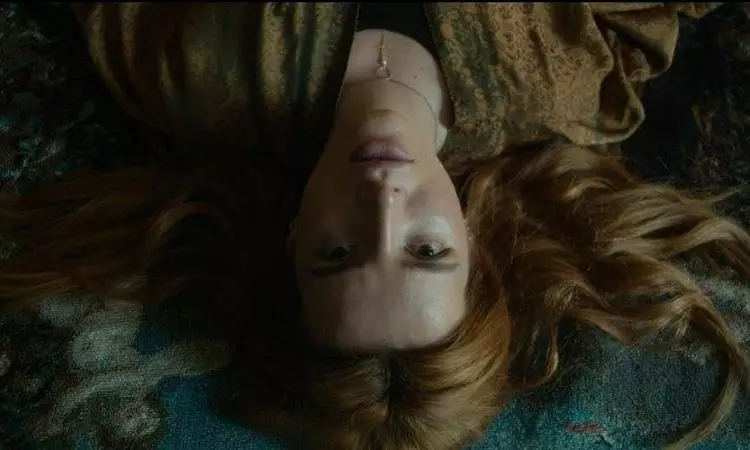In the realm of contemporary cinema, where strong female protagonists are often archetypes of empowerment or victimhood, *Saint Clare* breaks the mold by introducing a heroine whose complexity challenges traditional narratives. Clare Bleecker, portrayed with fervor by Bella Thorne, embodies a duality that oscillates between avenger and victim, a manifestation of women’s latent rage and a critique of societal norms.
The film opens with Clare ensconced in a provocative posture reminiscent of Christ, suggesting a deep connection to themes of sacrifice and martyrdom. Clare’s mantra—“Everything I have said and done has been in the hands of God”—echoes throughout the narrative, framing her tumultuous journey as both predestined and self-guided, much like Joan of Arc, whom she idolizes. In aspiring to be a protector of women against predatory men, she embraces a cause that ultimately leads her down a dark path. However, this pursuit is rife with ambiguity, as Clare’s actions reflect both a saintly drive and the chilling reality of a sociopathic killer. This duality raises questions about morality, justification, and the capability for violence hidden behind the guise of righteous indignation.
Clare’s character is deeply flawed, a complex tapestry woven from her tumultuous childhood experiences and her quest for identity and belonging. Juliana, played by Joy Rovaris, succinctly highlights Clare’s contradictions—“You’re smart, you’re pretty, but you’re dishonest.” This statement serves as a microcosm of Clare’s internal struggle; she is both the feminine ideal and a disillusioned outcast. The narrative skillfully weaves her moral deviations with her attempts to fit into the normative teenage experience, exposing the often-repressive expectations imposed on young women. By exhibiting dissociative tendencies and visions of the deceased Mailman Bob, Clare further blurs the line between reality and delusion, permitting the audience to engage with the fraying edges of her psyche.
In *Saint Clare*, the exploration of gender roles is a vital undercurrent. Clare’s disruptive presence parallels the gender-bending dynamics in her drama teacher Cole Edwards’ production of Ira Levin’s *Deathtrap*, signifying a thematic interrogation of identity and societal expectations. As she navigates her identity as “normal Clare Bleecker” while evading law enforcement investigating her string of violent encounters, the film portrays the harsh realities women face within a patriarchal construct. Questions of how women remain unseen or unaccounted for in society linger, challenging viewers to confront the historical threads of gender-based violence and misogyny. Clare’s violent encounters are not merely acts of retribution against her aggressors; they reflect her reclamation of autonomy in a world where women’s agency is routinely stripped away.
This film not only serves as a character study of Clare but also as a critique of societal attitudes toward women. Clare’s realization, “How do so many women go unnoticed?” resonates with the audience, provoking a vital feminist inquiry. Filmmaker Mitzi Peirone, alongside co-writer Guinevere Turner, delves into the darkness that underlines the mundane—how women are frequently marginalized, overlooked, or rendered invisible in narratives dominated by male experiences. This societal commentary extends beyond Clare’s personal vendettas, resonating with a collective female experience that is stigmatized and trivialized.
*Saint Clare* further complicates audience perceptions by asking viewers to grapple with empathy for a character whose actions are unforgivable. Clare’s murderous rampage against men—portrayed as threats—sparks a conflicted response: while she slaughters without remorse, her motivations are grounded in her lived traumas and the oppressive fear that pervades her existence. Despite her brutal acts, the film crafts a protagonist that, while morally ambiguous, invites sympathy for a woman driven to extremes by societal neglect and systemic violence.
Clare’s journey through *Saint Clare* is one of struggle and transformation—a multifaceted representation of a woman wrestling with her identity in a world rife with danger. The film, through its narrative complexity and societal critique, holds a mirror to our collective conscience, urging a reconsideration of how we perceive and name women’s struggles and their innate capacity for violence. By intertwining themes of redemption, agency, and identity, *Saint Clare* invites viewers into a dialogue about feminism, morality, and the price of survival in a hostile world. Ultimately, Clare emerges as both sullied and sanctified, a testament to the elaborate dance between victimhood and empowerment.

